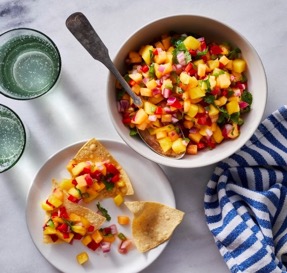 A Health Newsletter Serving the North Coast Schools Medical Insurance Group
A Health Newsletter Serving the North Coast Schools Medical Insurance Group
Vol. 27, No. 7 | July 2019
In this Issue: JPA Notes | Safety Tips for Travelers | Sun Safety Tips | Recipe: Peach Mango Salsa
JPA Notes
From the JPA Office

Employee Assistance Program Available July 1
The Guardian WorkLifeMatters Employee Assistance Program provides you and your family members with confidential, personal and web-based support on a wide variety of important and relevant topics to encourage their well-being: stress management, dependent/elder care, nutrition, fitness, as well as legal and financial issues.
Program highlights include:
- Unlimited telephonic assistance on common employee/workplace issues
- Life advice and professional counseling
- Caregiving
- Maternity education
- College planning
- Balancing personal and professional life
- Psychological counseling
- Legal services
- ID theft and fraud resolution support
- Monthly newsletters and e-mail alerts
Travel Related Insurance Protection Helps Ensure a Safe Trip
Guardian’s Travel Related Insurance Protection (TRIP) combines emergency travel and medical assistance with the added protection that comes from Guardian Life Insurance and Accidental Death and Dismemberment (AD&D) coverage. No matter if you are 100 miles or over 5,000 miles away from home, Guardian can help you be prepared.
TravelAid is available to you and your dependents around the clock and around the world, and ensures access to 24-hour emergency travel arrangements and funds. It also provides assistance with translation, embassies and consulates, lost documents, credit card replacements, and legal issues.
TravelAid Medical Assistance can minimize the impact of medical situations with global physician & hospital referrals, medical monitoring, emergency prescription replacement, evacuation, repatriation, global medical information, provider organizations, and payment guarantee of medical expenses.
Go to https://www.guardiananytime.com for more information on these programs.
Ten Safety Tips for Travelers
- Do your research before you travel. First rule of safe travel — don’t be ignorant about where you are going. Make an effort to learn about the country, the political situation, the cultural norms, the safest spots for travelers, safe accommodations to stay and the areas or regions that are best avoided.
- Blend in with your surroundings. Once you’ve done your research, you can start your visit to a new destination as if you were one of the locals. This is not only sound exploration advice, but a good safety tip as well. You’ll make yourself more vulnerable to con artists if you stick out like a sore thumb with your massive backpack, two cameras and confused look on your face. You will draw much less attention if you make an effort to blend in. You also don’t want to disrespect or offend with improper dress or manners.
- Don’t flash your wealth. Whether this is with cash or expensive gear, showing wealth will only make you more appealing to scammers and pickpockets. Carry a dummy wallet with little cash in it so that you can give this in case you are mugged.
- Stay safe in transport. Avoid air travel mishaps by frequently checking whether your flight has been rescheduled or canceled. When using bus services, make sure to go with trusted companies that have many positive reviews online. Moreover, try booking your tickets in advance whenever possible, so you don’t end up stranded on remote bus stops with no transport in sight. If you are hiring local taxis, agree upon the fare in advance in case the vehicle doesn’t have a meter.
- Keep your belongings safe. Avoid carrying too many luggage pieces and invest in a small sturdy lock for your luggage. Try to choose one that doesn’t stand out, so it doesn’t appear as if you have something really valuable inside. If you have a carry-on with you, never leave it unattended. Buy wallets that have RFID protection to avoid identity theft.
- Get travel insurance. Regardless of whether you are a natural worrier or not, don’t hesitate to take out travel insurance. Not only will insurance cover any unexpected injuries and trips to the hospital, it can also protect you from theft or loss of personal belongings.
- Have emergency info at hand. This should entail contact numbers for the local emergency services (police, fire department and ambulance) and for your country’s embassy (if there is one in the place you’re visiting).
- Manage your money. If you plan on using your debit and credit cards, make sure to notify your bank in advance that you’ll be abroad, or you may find your card blocked for suspicious activity. Research beforehand where are the best spots to exchange your money into local currency, as ATMs might be scarce in certain places. When out and about, always carry a small amount of cash with you.
- Keep track of your health. Make sure to have a supply of any over-the-counter essentials like motion sickness pills, probiotics, painkillers and bug repellents. Consult your doctor and get the proper vaccines before traveling. Ensure that any prescription pills are filled for some days extra than the intended length of your travel.
- Know how to communicate. Learn the basic emergency phrases like “I need help”, “Where is the nearest hospital/police station/embassy?” etc. in the local language.
Sun Safety for your Skin
The sun’s rays feel good, but they’re no friend to your skin. Though you won’t see it right away, they give you wrinkles and age spots, and they’re the top cause of skin cancer. Over time, the sun’s ultraviolet (UV) light harms fibers in the skin called elastin. When these fibers break down, the skin begins to sag and stretch. It also bruises and tears more easily, taking longer to heal.
Spending too much time in the sun can also give your skin freckles, rough texture, white spots, a yellowing of the skin, and discolored areas of the skin (which doctors call “mottled pigmentation”). It can also widen small blood vessels under your skin.
Nine Ways to Protect Your Skin
- Wear sunscreen every day, in all weather and in every season. It should have a sun protection factor (SPF) of 30 and say “broad-spectrum” on the label, which means it protects against the sun’s UVA and UVB rays. Put it on at least 15 minutes before going outside. Use 1 ounce, which would fill a shot glass.
- Reapply sunscreen at least every 80 minutes, or more often if you’re sweating or swimming.
- Wear sunglasses with total UV protection.
- Wear wide-brimmed hats, and long-sleeved shirts and pants.
- 5Avoid being out in the sun as much as possible from 10 a.m. to 2 p.m.
- Check your skin regularly so you know what’s normal for you and to notice any changes or new growths.
- Choose cosmetics and contact lenses that offer UV protection. You still need to use sunscreen and wear sunglasses with broad-spectrum sun protection.
- If you’re a parent, protect your child’s skin and practice those habits together.
- Don’t use tanning beds.
Recipe of the Month:
Peach-Mango Salsa
Scoop this easy and healthy peach-mango salsa up with tortilla chips, serve it with grilled chicken, salmon or pork chops, or use it as a taco topper. It’s a versatile and vibrant addition to all sorts of meals.
Ingredients
-
2 medium fresh peaches, peeled, seeded and diced (about 2 cups)
-
1 mango, diced (about 1½ cups)
-
½ cup diced red onion
-
½ cup diced red bell pepper
-
1 jalapeño pepper, seeded and minced
-
½ cup coarsely chopped fresh cilantro
-
2 tablespoons lime juice
-
¼ teaspoon salt
Instructions
-
Combine peaches, mango, onion, bell pepper, jalapeño, cilantro, lime juice and salt in a medium bowl. Let stand for 10 minutes before serving. Prep time 10 minutes, ready in 20.

